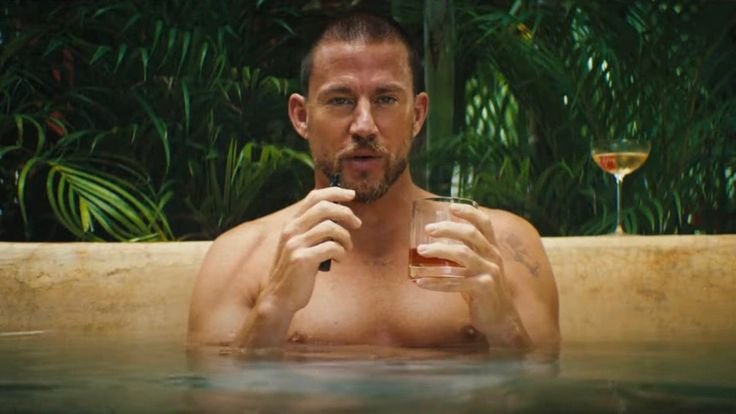‘Blink Twice’ and You’ll Miss Kravitz’s Directorial Brilliance
By Natalie McCarty
Image Courtesy of Channing Tatum's Instagram
Walking straight out of the theater, I felt compelled to start this review immediately. When Zoë Kravitz announced her directorial debut with Blink Twice (formerly known as project Pussy Island), the anticipation was electric. Known for her effortlessly cool persona and her knack for turning any project into a cultural touchstone, the stakes were high. Despite my admiration for Kravitz's work, I approached the film with a touch of skepticism. Could it truly live up to the immense hype? Would it highlight Kravitz’s directorial skills, or would it struggle beneath the weight of its own expectations?
Within the first ten minutes, all doubts were swiftly forgotten (though not to be confused with the “forgetting is a gift” mantra). Blink Twice emerges as an audacious, edge-of-your-seat psychological thriller that feels like a lovechild of Jordan Peele’s Get Out and Liane Moriarty’s Nine Perfect Strangers, with heavy overtones reminiscent of The Menu and the striking visual quality of Triangle of Sadness. It masterfully blends tension with dark humor, delivering a narrative that is both unsettling and visually stunning. The film’s visual style pays homage to Kravitz’s cinematic influences, while the storyline serves as a critique of the darker aspects of humanity that she seeks to expose.
Image Courtesy of Channing Tatum's Instagram
The film centers on a seemingly idyllic retreat designed to help its participants unlock their deepest desires and traumas. What starts as a serene getaway quickly devolves into a psychological nightmare, where nothing is as it seems, and every character harbors a dark secret. The narrative unfolds with meticulous pacing, drawing viewers into its twisted world while keeping them on edge until the very end. Not to toot my own horn, but it's incredibly rare for a film to pull a fast one on me. Even rarer is the ability to deliver multiple plot twists in the final act without veering into cliché or becoming overwhelming. Blink Twice not only achieved that, but it also left me both shocked and stunned.
Kravitz’s ability to craft a tense, atmospheric environment is nothing short of extraordinary. The film’s cinematography is a visual feast, with every frame carefully composed to heighten the sense of unease. The color palette, oscillating between warm, inviting tones and cold, clinical shades, mirrors the film’s duality—what appears comforting on the surface is often hiding something sinister underneath.
Image Courtesy of Zoë Kravitz's Instagram
One of the film’s standout elements is its soundtrack, which feels like a direct nod to Kravitz’s High Fidelity days. It’s rare to find a film that seamlessly weaves together the avant-garde stylings of Yoko Ono with the undeniable power of Beyoncé, but Blink Twice achieves this with ease. The soundtrack not only complements the film’s narrative but also elevates it, adding layers of emotional depth and resonance. These needle drops aren’t just musical moments; they serve as emotional punctuation marks that guide the audience through the film’s shifting tones. And, of course, who doesn’t love James Brown?
Image Courtesy of Zoë Kravitz's Instagram
What truly sets Blink Twice apart, however, is its storytelling. The script, co-written by Kravitz and a team of emerging screenwriters, is sharp, intelligent, and unafraid to explore the darkest corners of the human psyche. The dialogue is witty and biting (this was an intentional choice of words), while the plot twists are expertly timed, ensuring that the audience remains on edge, perpetually poised for the next revelation.
The performances are stellar across the board. Kravitz’s casting choices are impeccable, with each actor bringing a unique intensity to their role. I’d argue that this is Channing Tatum’s most complex role to date—a true testament to his versatility as an actor. Naomi Ackie delivers a stunning, riveting performance, while Alia Shawkat is a welcome presence in any cast. This film marks a phenomenal next step for Adria Arjona after Hit Man. Christian Slater and Kyle MacLachlan make triumphant returns, adding depth and gravitas to the ensemble. Truly phenomenal casting.
Image Courtesy of Channing Tatum's Instagram
As the film hurtles toward its shocking conclusion, it becomes clear that Blink Twice is not just a film—it’s a statement. Zoë Kravitz's directorial debut is a bold proclamation of her arrival as a formidable force in filmmaking. The film’s exploration of identity, power, and the human condition is both timely and timeless, ensuring its impact will linger long after the credits roll. I truly find myself unable to stop thinking or talking about it.
In the end, Blink Twice stands as a triumph. Kravitz has demonstrated that she is not just a gifted actress but also a visionary director with a unique voice and perspective. The film is a must-see for any cinephile. Though it may be a disturbing watch, its thought-provoking nature makes it absolutely worth your time.
If Blink Twice is any indication, it’s just the beginning of what promises to be a distinguished directorial career for Kravitz.
Film Still from Blink Twice (2024)
And you know what, a man’s downfall really would be his vape.






